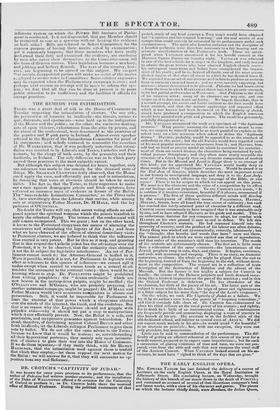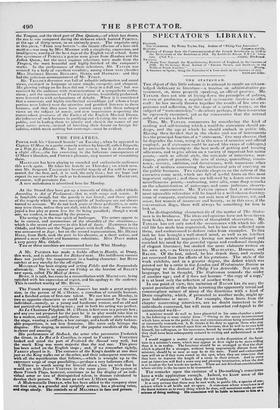THE EARLY ENGLISH OPERA.
MR. EDWARD TAYLOR has just finished the delivery of a course of Lectures on the early English Opera, at the Royal Institution is Albemarle Street. His concluding lecture, on Wednesday, brought the history of this branch of our music down to the death of PURCELL; and contained an account of several of that illustrious composer's best and latest works, with a view of his character and genius. The pieces on which the lecturer chiefly dwelt, were I3onduas, the Indian Queen, the Tempest, and the third port of Don Quixote,—of which last drama, the mu-se was composed during the sickness which hurried Puncess. at the nge of thirty-seven, to an untimely grave. The exquisite sone In this piece, " From rosy bowers "—the frantic effusion of a love-sick maiden—was sung by Miss MASSON with a simplicity, expression, end intalligeuee, worthyof the best days of the English voeal school. Some fine specimens of PURCELL'S genius were given from Bonduca and the Indian Queen; but the most copious selections were made from the Tempeil, the most beautiful tied highly-finished of' the composer's works. In the performance of these selections, Mr. TAYLOR was assisted by H body of excellent vocalists; among whom were (besides Miss Massoe) Messrs. BELLAMY. 110111iS, and /Domes : and they had the,judiciutis accompanimeet of Mr. Teases Mr. TAYLOR'S discourse was full of valuable information and sound views, conveyed in language at once simple, energetic, and eloquent. His glowing eulogy on his he.° did not "sleep in a dull ear," but was received by the audience with demonstrations of a sympathetic enthu- siasm ; mid the specimens of PutICELL'S geeius, beautifully performed, were listened to with acclamations of delight. When it is considered that a numerous and highly-intellectual assemblage (of whom u large portion were ladies) were the attentive and gratified listeners to these lectures, and that they must have carried away with them enlarged views on the subject of music, and new impressions respecting the transeendent greatness of the Father of the English Musical Drama. the intlumwe of such lectures in purifying and elevating the taste of the public, lied in leaditig them to admire and cheriab the names of our great native artists—instead of lavishing their favour on foreign fri- volities, which meeit nothing but contempt—must be evident.



























 Previous page
Previous page